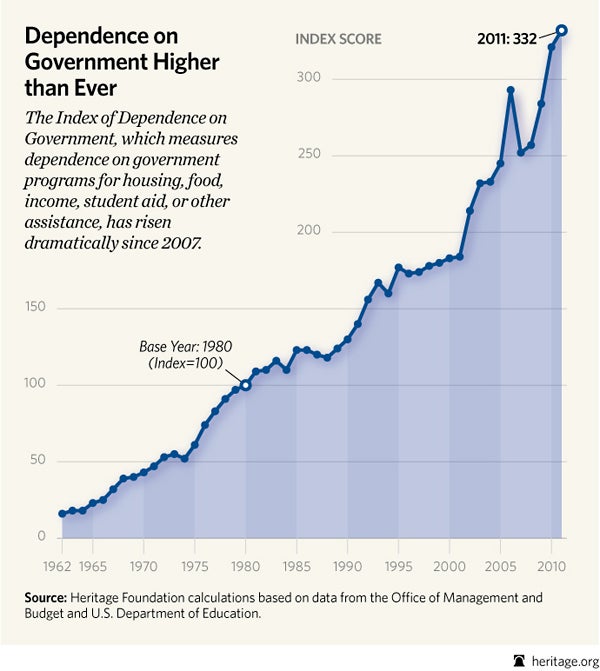The leak of a video featuring former Governor Mitt Romney (R-MA) has sparked debate about government dependency and the number of people in the United States who do not pay federal income tax. The Heritage Foundation has published the Index of Dependence on Government for the past 10 years, and the Center for Data Analysis offers a preview of next year’s report.
The Index tracks government spending on the federal programs that breed government dependency. The Index rises 3.28 percent in next year’s report, for which 2011 is the latest year the underlying data are available. It is adjusted for inflation, so it rises or falls because of spending in real dollars. The updated Index reveals:
- Government dependency jumped 3.28 percent in 2011, with the largest increases in higher education loans and grants and in retirement spending.
- This is the fourth year in a row that the Index has risen, rising 31.73 percent in that time.
- At the same time, nearly half of the U.S. population (48.47 percent) does not pay any federal income taxes.
Today, more people than ever before depend on the federal government for housing, food, income, student aid, or other assistance once considered to be the responsibility of individuals, families, neighborhoods, churches, and other civil society institutions. The United States reached another milestone in 2010: For the first time in history, half the population pays no federal income taxes.
It is the conjunction of these two trends—higher spending on dependence-creating programs, and an ever-shrinking number of taxpayers who pay for these programs—that concerns those interested in the fate of the American form of government.
In last year’s 2012 Index of Dependence on Government, it was reported that 70.5 percent of federal spending goes to dependency creating programs—showing that the often-repeated mantra, “We have a spending problem, not a revenue problem” could not be more true. One need look no further than the results of the 1996 welfare reform that started work requirements for able-bodied people to receive cash welfare payments to see that it is possible for people to become more self-sufficient.
More data from the upcoming 2013 Index of Dependence on Government will be released next month.



























